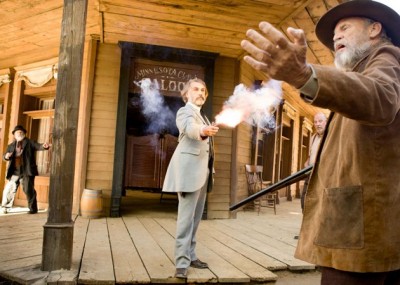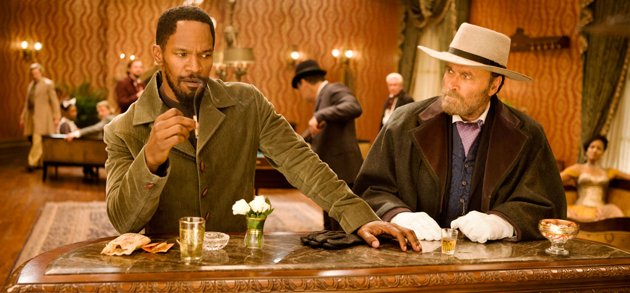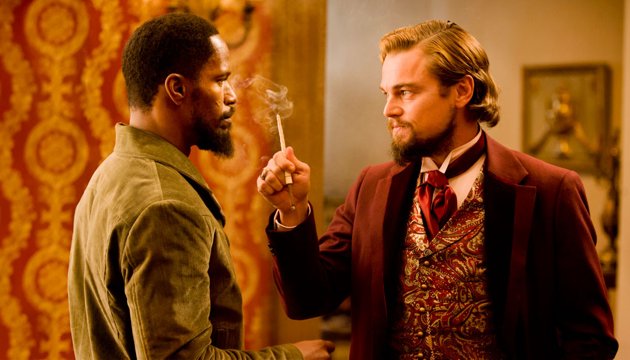Django Unchained — a film review by Gary Chew
If revenge is really sweet, then Quentin Tarantino has a sweet tooth. He’s really indulged himself in the writing and directing of his latest screen splatter, “Django Unchained.” But Quentin has never been known to not overdo things. Fortunately though, he does make for a broader diversity of movies.
Tarantino is the movie freak’s movie freak. He knows more about films and directors, probably, than the likes of 10 Pauline Kaels. Two strong influences in “Django” are borrowed from film directors Sam Peckinpah and Mel Brooks. At a recent screening of “Django Unchained,” I had to remind myself more than once that I wasn’t watching “The Wild Bunch” and “Blazing Saddles” simultaneously.
 Clearly, the unchaining of Django is about acquiring freedom … freedom for the lead character, played not by Cleavon Little, but Jamie Foxx. A traveling salesman sort of bounty hunter, masquerading as a dentist and known as Dr. King Schultz, literally unshackles Django early in the film, which makes him a free man. (It’s 1858.) Schultz, played by Christoph Waltz, is a learned gentleman who exhibits European sensibilities but knows how to cleverly dispatch wanted men at large in pre-Civil War America. Dr. Schultz is also quite the marksman.
Clearly, the unchaining of Django is about acquiring freedom … freedom for the lead character, played not by Cleavon Little, but Jamie Foxx. A traveling salesman sort of bounty hunter, masquerading as a dentist and known as Dr. King Schultz, literally unshackles Django early in the film, which makes him a free man. (It’s 1858.) Schultz, played by Christoph Waltz, is a learned gentleman who exhibits European sensibilities but knows how to cleverly dispatch wanted men at large in pre-Civil War America. Dr. Schultz is also quite the marksman.
After Django has shed his slave status, it seems like a perfect match that he and Schultz team up for making a living by killing white outlaws, then letting the legal system pay the pair for bringing in the corpses. As I said, it’s 1858 but it’s the good doctor and Django … not the Lone Ranger and Tonto.
Schultz learns that Django’s wife, Brunhilde (Kerry Washington), was taken from her husband earlier, and sold away to a Mississippi plantation. Django doesn’t know just where she is or who bought her, but he wants to find her, save her and continue their life together.
Those European sensibilities of Dr. Schultz respond to Django’s plight and he throws in with the former slave to rescue Brunhilde while they do a little bounty hunting on the side.
Schultz is curious also that Django’s Brunhilde speaks German, since she had spoken it in conversation, while growing up, with a slave owner family member fluent in the tongue. There’s also a thumbnail narrative spoken by Schultz to Django about Siegfried, Wotan and … you know, the princess, Brunhilde. Dr. Schultz is up on his German epics.
Almost everyone else in “Django Unchained” plays a “good” old boy American type, the likes of which are portrayed by Bruce Dern, Don Johnson, Walton Goggins and others too numerous and gnarly to mention. Some even resemble Sam Peckinpah.
 Two standouts not in the good old boy category are Calvin Candie (Leonardo DiCaprio) and Stephen (Samuel L. Jackson). The Stephen character is something of a new kind challenge for Jackson. Samuel makes the delivery. Candie has a plantation and is a slave owner, and Stephen is Candie’s main man on the plantation and personal assistant.
Two standouts not in the good old boy category are Calvin Candie (Leonardo DiCaprio) and Stephen (Samuel L. Jackson). The Stephen character is something of a new kind challenge for Jackson. Samuel makes the delivery. Candie has a plantation and is a slave owner, and Stephen is Candie’s main man on the plantation and personal assistant.
Holding to his principal artistic theme, Tarantino has you wallowing in revenge. Those receiving the brunt of the revenge in “Django” deserve what they get, but I became inured to the humor of it all, well before the film ends. Reveling in punishment of racist slave traders, a la Tarantino, carries the film close to the precipice of being fascistic.
Remember Peckinpah’s “Straw Dogs”? Dustin Hoffman’s timid “David” is beginning to “like it” by the time he’s finally dispatched the men who’ve been involved with the rape of his wife and invasion of their rural home.
The blood-splashing gun fights of “Django,” for me, became excessive. Watching violence to the max often desensitizes the viewer so that even more of it is needed to get the rush it can bring to someone filled with righteous indignation for being repeatedly treated as subhuman. The blacks in this film are treated so. The movie comically mocks those inclined to treat minorities harshly, but it could be, as well, a lesson to be learned by racists. How much of this kind of entertainment, though, might also be motivation for stirring violent action in those minorities deeply affronted? Tarantino’s subtext for being a hater of racists suggests it’s cool.
I’m interrupted while writing this by the horror and tragedy of the elementary school massacre. Besides the shock the shooting brings, it’s set me wondering if – and if so, how much – the man who shot dead so many young schoolchildren had been excessively exposed to a culture of weapons or media and video game violence during much of his short 20 years of life. I don’t think I would’ve laughed as much at the comeuppances that Tarantino puts to the racists and Uncle Toms in “Django Unchained,” had I seen it after all that real ammunition that’s been fired in a classroom full of little kids.
Finally and cinematically, it will always be that “Pulp Fiction” is a tough act for Quentin Tarantino to follow.

- Movie Review: ‘The Glorias’ - September 28, 2020
- Movie Review: ‘I’m Thinking of Ending Things’ - September 10, 2020
- Movie Review: ‘The Burnt Orange Heresy’ - August 31, 2020


